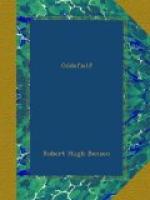“Well, you are come then!” said Dolly to me—“and we not ready for you.”
“I am ready enough for home,” said I. And she smiled very friendly at me for that word.
“I am glad you call it that,” said she.
* * * * *
There was but a little dried fish and rice for supper that night, as it was a fast day; but the supper of Christmas Eve is always a kind of sacramental for me, when midnight mass is to follow. There was no midnight mass for us that Christmas, nor any mass at all; though I suppose it was celebrated as usual in the Ambassadors’ chapels, and the Queen’s: yet the supper had yet that air of mystery and expectancy about it.
“We are all to dance to-morrow night,” said Dolly.
“So that is why the floor is cleared in the Great Chamber,” I said.
She nodded at me. She looked more of a child than I had ever seen her.
“Will you dance with me, Dolly?” I asked.
“Yes,” she said, “but my first is with my father.”
I told them presently, though it was but a melancholy tale for Christmas Eve, of my Lord Stafford’s trial, and all that I had seen there; and of the supper last night in Whitehall.
“My Lord is to be beheaded in five days,” I said. “We must pray for his soul. He will die as bravely as he has lived; I make no doubt.”
“And you have no doubt of his innocence?” asked Cousin Tom.
I stared on him.
“Why no,” I said, “nor any man, except those paid to believe his guilt.”
He pressed me to tell him more of what I had seen in London; and whether I had seen the Duke of Monmouth again.
“He is in Holland,” I said, “under His Majesty’s displeasure. But I saw Her Grace of Portsmouth.”
“Why, that is his friend, is it not?” asked Tom.
“Yes,” I said, “and a poor friend to his father and the Duke of York.”
* * * * *
The next night was a very merry one.
We had dined at noon as usual: and that was pretty merry too; for all the servants dined with us, and the men from the farm and their wives. It was sad to have had no mass at all; and all that we had instead of it was the sound of the bells from Hormead, from the church that had been our own a hundred and fifty years ago—which was worse than nothing. At dinner we observed the usual ceremonial, with the drinking of healths and the burning of candles; and Dolly and her father and her maid sang a grace at the beginning and end—with a carol or two afterwards that was a surprise to me. It was very homely and friendly and Christian; and I saw my man James with his arm around one of the dairymaids—which is pretty Christian too, I think. We kept it up till it was near time to get supper ready, telling of stories all the while about the fire in the old way. Some of them were poor enough; but some were good. Dick, the cow-man, whom we had long suspected




